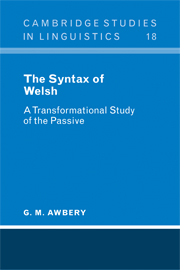Summary
In this chapter an analysis of passive sentences is presented, which builds on the analysis of actives already established. It is suggested that passives, like periphrastic forms, contain an embedded sentence with a tenseless verb. In sections 2.1. to 2.4 the derivation of straightforward passives is considered, and in section 2.5 some variations on this type. In section 2.6 a problem first raised in section 2.4.3 is followed up more fully.
Active and passive pairs
Examples of active and passive pairs are given in (1) to (6). Each pair of sentences appears to be synonymous.
(1) Rhybuddiodd y dyn y bachgen.
Warned the man the boy.
(2) Cafodd y bachgen ei rybuddio gan y dyn.
Got the boy his warning by the man.
i.e. The boy was warned by the man.
(3) Rhybuddiodd y plant y merched.
Warned the children the girls.
(4) Cafodd y merched eu rhybuddio gan y plant.
Got the girls their warning by the children.
(5) Rhybuddiai'r ferch y dyn.
Was warning the girl the man.
(6) Câi'r dyn ei rybuddio gan y ferch.
Was getting the man his warning by the girl.
In each case, the passive sentence has a sentence-initial inflected form of cael (get) of the same tense and aspect as the verb of the active. This is followed by a noun phrase identical to the object of the active.
- Type
- Chapter
- Information
- The Syntax of WelshA Transformational Study of the Passive, pp. 47 - 89Publisher: Cambridge University PressPrint publication year: 1977



